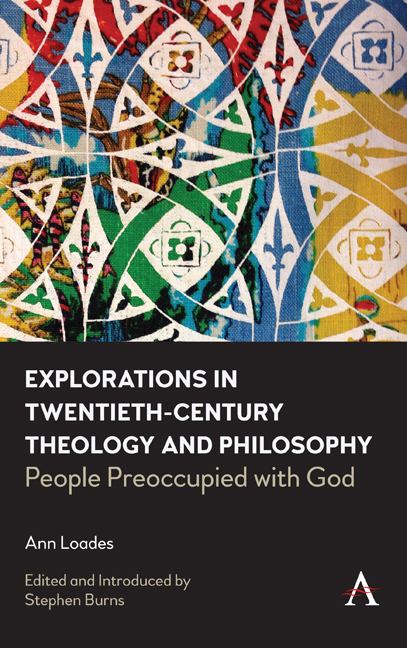Book contents
- Frontmatter
- Contents
- A Personal Note
- Foreword
- Introduction: The Grace of Intelligence
- Chapter One Evelyn Underhill (1875–1941): Mysticism and Worship
- Chapter Two Evelyn Underhill: As Novelist – Exploring Mysticism
- Chapter Three Dorothy L. Sayers (1893–1957): War and Redemption
- Chapter Four Dorothy L. Sayers: Are Women Human? Considering Dante’s Beatrice
- Chapter Five C. S. Lewis (1898–1963): On Gender
- Chapter Six C. S. Lewis: On Grief
- Chapter Seven Austin Farrer (1905–1968): Love Almighty and Ills Unlimited
- Chapter Eight Austin Farrer: And Friends
- Chapter Nine Simone Weil (1909–1943): Resistance and Writing
- Chapter Ten Simone Weil: Eucharistic Sacrifice – Exploring a Metaphor
- Chapter Eleven Stephen Sykes (1939–2014) and Colleagues: Exploring the Problematic Legacy of Power
- Afterword: The Passionate Intellect of Ann Loades
- Acknowledgements
- Bibliography
- Contributors
- Index
Chapter Four - Dorothy L. Sayers: Are Women Human? Considering Dante’s Beatrice
Published online by Cambridge University Press: 18 November 2023
- Frontmatter
- Contents
- A Personal Note
- Foreword
- Introduction: The Grace of Intelligence
- Chapter One Evelyn Underhill (1875–1941): Mysticism and Worship
- Chapter Two Evelyn Underhill: As Novelist – Exploring Mysticism
- Chapter Three Dorothy L. Sayers (1893–1957): War and Redemption
- Chapter Four Dorothy L. Sayers: Are Women Human? Considering Dante’s Beatrice
- Chapter Five C. S. Lewis (1898–1963): On Gender
- Chapter Six C. S. Lewis: On Grief
- Chapter Seven Austin Farrer (1905–1968): Love Almighty and Ills Unlimited
- Chapter Eight Austin Farrer: And Friends
- Chapter Nine Simone Weil (1909–1943): Resistance and Writing
- Chapter Ten Simone Weil: Eucharistic Sacrifice – Exploring a Metaphor
- Chapter Eleven Stephen Sykes (1939–2014) and Colleagues: Exploring the Problematic Legacy of Power
- Afterword: The Passionate Intellect of Ann Loades
- Acknowledgements
- Bibliography
- Contributors
- Index
Summary
There are three personal names in my title, to begin with the obvious, and I shall say least directly about Dante himself (1265–1321). I want to say something about Dorothy L. Sayers (1893–1957) and two of her essays before turning to her focus on Dante's Beatrice, and why she found that focus so immensely rewarding. Let me begin by explaining that I discovered this more ‘academic’ Sayers more or less by accident. The year 1993 was the centenary of Sayers's birth (she died in 1957), and I seized the opportunity offered to me to put together an integrated anthology of her work, that is to say, of her spiritual and theological writings set into a narrative of her life. Many of her poems and essays on spiritual and theological themes are now little read or remembered, though important in their day, despite the continuing popularity of her detective novels. I would hope that reading her theology would not be as much an exercise in nostalgia as some of the reading of her novels may be. For some of her work, most notably The Mind of the Maker (1941), deserves a place in an authorised list of writings about the Trinity, and of the Trinitarian self-understanding of a writer such as she was, a writer of excellent detective fiction at that! And some of that fiction may be important to prepare a reader for what Sayers has to say about Dante's Beatrice – Gaudy Night (1935) is the most obvious example. Among other things, Gaudy Night is an unabashed defence of academic or intellectual work, irrespective of its market value; of such work as undertaken by women in particular, and of the problems which arise when intellect and emotion are out of harmony with one another, a harmony crucial for the experience of ‘freedom’. That enjoyment of women's intellectual qualities, and of the integration of intellect and emotion, are alike characteristics of Dante and Dante's Beatrice, and not surprisingly are central to Sayers's own aspiration for herself. Not always aware of the ways in which her theology was an act of self-interpretation, she was sensitive to the way in which this was true in the case of Dante's portrayal of Beatrice, and the phrase ‘passionate intellect’ she used of herself as she used it of him.
- Type
- Chapter
- Information
- Explorations in Twentieth-Century Theology and PhilosophyPeople Preoccupied with God, pp. 51 - 62Publisher: Anthem PressPrint publication year: 2023

